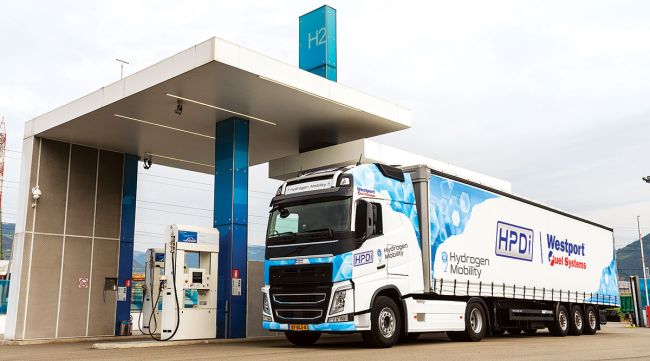A Westport Fuel Systems Volvo truck. Linde’s pilot project is one of a number of collaborations between Westport and Volvo Group. (Westport Fuel Systems)
The first testing of natural gas-fueled European Volvo Group Class 8 trucks on North American roads is set to begin by the end of September, and more imports could be on the way.
Part of a pilot project in Alberta, Canada, run by industrial gas and chemicals giant Linde, five Volvo FH models equipped with Westport Fuel Systems’ high-pressure gas-injection fuel system will undertake testing, according to the Vancouver, British Columbia-based alternative fuel system specialist.
The “Linde LNG Project” will use Volvo European FH models with 460 Euro 6, 13-liter engines that can run on renewable bio-liquefied natural gas (biogas) or LNG and use Westport’s high-pressure direct injection system.
Westport CEO David Johnson said during the company’s second-quarter 2023 earnings call Aug. 9 that “the first of those trucks [were] arriving in Canada around now.”
“Today, in the marketplace around the world, the only place you can buy an HPDI-equipped truck is in Europe. From our perspective, the opportunities in China and North America and really the rest of world are quite significant,” Johnson said, adding, “We see application in basically all the [heavy-duty trucking] markets.

Johnson
“And we look forward to the validation of those vehicles in the Canadian market because that will then prime the pump, so to speak, for more imports. It’s a really exciting development for us that the European Volvo truck with HPDI can be imported into Canada now.”
The trucks have been commercially available in Europe since 2018, and the Canadian government granted exemptions for the tractors to be deployed without modification, Westport spokeswoman Christina Kraning said in an email Aug. 9.
Linde’s pilot project is one of a number of collaborations between Westport and Volvo Group. In July, the companies announced an HPDI joint venture, in which the parent company of Volvo Trucks North America will take a 45% stake.
The JV is expected to launch in the first half of next year. Volvo — which sells the Volvo Trucks and Mack Trucks brands in the U.S. Class 8 market — will pay $28 million for the stake in the business and could contribute as much as $45 million more.

Host Michael Freeze clarifies the differences between predictive and preventive maintenance. He gives fresh commentary on everything from how enhanced connectivity boosts your preventive maintenance plans to what predictive possibilities AI can offer your shop. Tune in above or by going to RoadSigns.ttnews.com.
Before then, Volvo is launching revamped bio-LNG-fueled trucks. The upgraded Volvo FH and FM models will have up to 500 hp, revamped engines that the company believes will make them up to 4% more fuel efficient, and a tank that is 10% bigger, which will offer a longer range, according to the Swedish company.
Westport said the launch hurt its second-quarter revenues as customers shied away from purchasing existing options, although executives said this was to be expected. Sales are now ramping up, Johnson said.
Westport reported record quarterly revenue of $85 million in the most recent three-month period, up 6% from $80 million in the same period in 2022.
The increase was largely driven by increased sales volumes at its delayed original equipment manufacturer, electronics and fuel storage businesses as well as extra aftermarket sales in Eastern Europe and South America.
Westport’s net loss for the most recent quarter widened to $13.2 million or 77 cents per diluted share from $11.6 million or 68 cents per share in the same quarter a year earlier as a result of an intellectual property royalty settlement.
Johnson said in a statement that the results were solid given global economic and industry environments. In addition to the boost from Volvo, Johnson said late 2023 would see the start of liquid petroleum gas fuel system production and sales to an unnamed global OEM customer.
The results received positive feedback from analysts. “We see [the second-quarter results] as the latest illustration of Westport’s position as a key enabler of its OEM partners’ decarbonization plans, a view that is supported by the planned HPDI JV with Volvo, which is strong validation and will cement it as the path forward for Volvo and (we think) other OEMs’ internal combustion engine offerings (the vast majority of the overall market today and for the foreseeable future),” Craig-Hallum Capital Group Senior Research Analyst Eric Stine said in a research note issued after the company’s earnings call.






